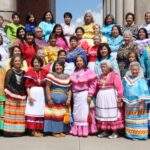GOD SAVES
Ezekiel 11:2–4, 14–21
God’s people often assume God will bless them, regardless of their obedience or disobedience, because they were born into covenant relationship with Him (as Jews may assume), or because they “grew up in church” (as some Baptists may assume). They may be ignorant that repentance, faith and obedience are fruit borne out in the lives of Christians who have been born again, saved by grace through faith.
Old Testament prophets were called out by God, announcing His judgment to a city or a nation as an invitation for the hearers to repent, be reconciled and experience restored fellowship with God. In Ezekiel 11, readers will note three distinct sections: a vision of judgment on disobedience, a promise of redemption and restoration and a vision of God’s glory departing from Jerusalem. We will look at the first two sections.
Called Out (2–4)
The spirit of God reveals to Ezekiel a vision of Jerusalem. Twenty-five leaders are gathered together to discuss the current affairs of the city. Rather than considering the welfare of the inhabitants, they are conceiving plans for their own benefit, characterized as evil.
Gathered (14–17)
While God’s people are scattered among the nations, the time is coming when God will gather believers from the nations into the land of Israel. These words reflect God’s promises in the Torah, particularly in Deuteronomy. In the post-exilic period, Nehemiah reminds God of His promises when he prays, “… if you return to me and carefully observe my commands … I will gather them from there and bring them to the place where I chose to have my name dwell” (Neh. 1:9).
God has always had a plan to redeem a people to Himself from every tribe, tongue and nation. From Genesis to Revelation, the Scriptures record God’s promises that the nations will know Him. In the prophets, we continually read God is making Himself known to the nations. Take time to read judgment oracles against the nations in Isaiah 13–23, Ezekiel 25–35, Amos 1–2 and Jonah 3. Why are these indictments against the nations? God invites the guilty parties to confess their sin, repent of their wickedness, trust God’s word and surrender to live in covenant fellowship with Him.
Sanctified (18–21)
Jeremiah writes of a new covenant coming to the house of Israel and the house of Judah (Jer. 31). This passage in Ezekiel 11 underscores this new covenant, emphasizing a consecrated gathering of believers in the Promised Land, a transformed people with a new heart and a new spirit. No longer will they pursue abominable idolatries. Instead, the inhabitants will live in covenant fellowship with God: “They will follow my statutes, keep my ordinances and practice them.”
We cannot save ourselves, and we cannot become holy without the redeeming work of Jesus Christ. His sacrifice ratified the new covenant. Thank God He exchanges our hearts of stone for hearts of flesh to trust the Incarnate Christ.
By Douglas K. Wilson, Ph.D.
Wilson is dean of Christian Studies at University of Mobile in Alabama.




